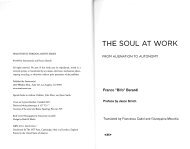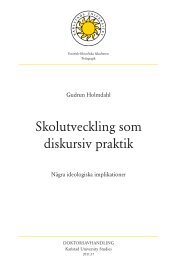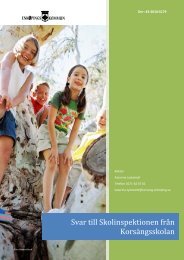FULLTEXT01
FULLTEXT01
FULLTEXT01
You also want an ePaper? Increase the reach of your titles
YUMPU automatically turns print PDFs into web optimized ePapers that Google loves.
English summary<br />
Introduction<br />
A significant part of educational science rhetoric emphasizes that the world has<br />
undergone profound changes. Talk of globalization – „the discourse of<br />
globalization‟- claims that various phenomena are now interconnected and that<br />
this results in a variety of underlying tensions that simply must be dealt with.<br />
Radical transformations in the education system and the labour market are<br />
associated to globalization, as if there were an unquestionable, essential, causal<br />
link between this and that in that particular case (Angus, 2004; Wilding, 1997).<br />
Formal training is focused, and made into some sort of salvation and something<br />
that must be prioritized. Some scientists call it „The Education Gospel‟ (Grubb<br />
& Lazerson, 2006).<br />
Both to „the discourse of globalization‟ and „The Education Gospel‟, it is<br />
possible to link multiple discursive manifestations like partnership,<br />
collaboration, participation and 'lifelong learning', all of which have great<br />
impact in various policy documents at both a national and an international level.<br />
These manifestations are launched as strategies for coping with the many<br />
assumed challenges of globalization and in the motley crew of these<br />
imperatives, described above, the talk concerning school development is a<br />
typical feature.<br />
School development is a frequently used word in Sweden and has been so<br />
during at least the previous 15 years. The concept is given a prominent position<br />
in a number of texts, more often in educational contexts. It is no overstatement<br />
to speak of school development as a branch.<br />
There are, says Foucault (1977/2003), reasons to respond skeptically, especially<br />
for arrangements or rituals of power marked by freedom and possibility claims<br />
– so called „self-discipline‟ – e.g. such that make subjects feel empowered.<br />
Authoritarian tendencies and claims to power, in order to follow Foucault<br />
further, may namely emerge in a seemingly democratic discourse.<br />
School development may sound appropriate and commendable, just like<br />
student care can, but even such terms presuppose something, such as students<br />
would be especially in need of care or that schools would be particularly in need<br />
of development. Of course, that kind of axioms may be questioned, when in<br />
170






